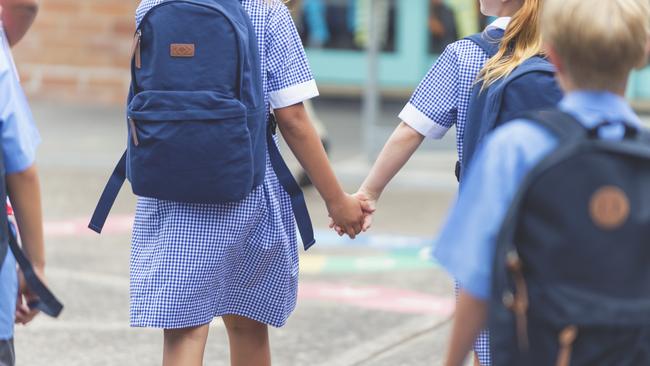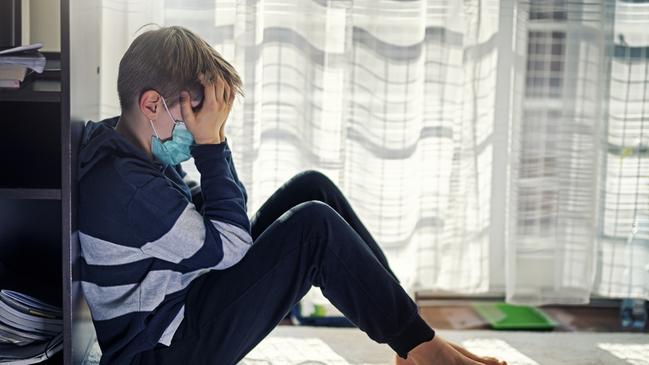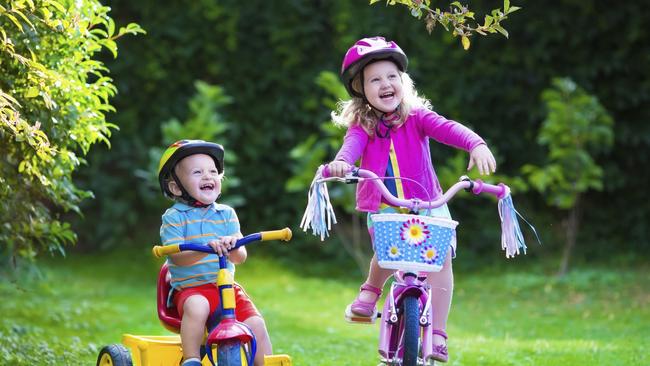The 11 ways Covid will impact on your child’s future
A new study has identified 11 long term impacts of Covid on children that touch every aspect of their lives – from academic performance to physical and mental development.
National
Don't miss out on the headlines from National. Followed categories will be added to My News.
Children are facing a “generation-defining disruption” from the Covid pandemic even though its health effects on young people are generally not serious, a major new study has found.
While kids mostly had only mild cases of the virus, they suffered in other ways including developing learning deficits, increased abuse and neglect, missed vital health checks and mental health problems.
On the upside, children’s emergency department visits decreased in Australia by 104,105, partly due to lower rates of infections and injuries, JobKeeper reduced poverty by 32 per cent and there was no drop off in childhood vaccination rates.

School closures had a devastating effect on four million children and their futures, costing the economy the equivalent of $871 billion in lost Gross Domestic Product.
The Murdoch Children’s Research Institute report, published in the Medical Journal of Australia, sourced that data to 2020 OECD analysis which calculated long term economic losses if schools were closed for one third of the year.
“Almost half of the Australian student population risks having their learning severely compromised due to Covid-19-related school closures, either because they are an early years student or are experiencing adversity,” the Murdoch Children’s Research Institute report concluded.
“It is predicted that re-engagement in school context will be diminished, with poorer academic outcomes.”
Even preschool learning was impacted, with recent data suggesting that children born during the pandemic may already be demonstrating reduced cognitive performance.

Mental health difficulties significantly increased for children who experienced a second lockdown, with 20 to 46 per cent of mental health problems measured in the high range and two to 13 per cent in the very high range.
Demand for help from the Kids Helpline surged by 4.6 per cent a month and there was a 5.7 per cent per month jump in help-seeking for suicidal ideation or self-harm.
Some children with existing mental health disorders experienced an exacerbation of symptoms, the report by Sharon Goldfeld and others found.
Children did less exercise as a result of the pandemic affecting their physical skills and development.
Lockdowns saw children increase their screen time by 55 minutes a day and they spent 81 less minutes a day outdoors.
Closure of services and fear of catching Covid saw babies and young children miss vital health and dental checks and 31 per cent of unwell or injured kids delayed or avoided accessing health care, primarily because of parental fear of exposure to the virus.
Nearly half of all parents (46 per cent) reported a negative impact on their mental health, while parent mental distress tripled from eight per cent before Covid-19 to 24 per cent during the pandemic.

Lifeline Australia reported its highest volume of calls in its 58-year history in the first week of August 2021, while much of Australia was in lockdown.
The report says children living in households where they were already experiencing adversity suffered the most from Covid.
A marked increase in the incidence of abuse-related head injuries among children was reported at the start of the Covid-19 pandemic.
And notifications made to child protection services increased once restrictions eased and children were able to leave their home environment.
To overcome the problems, the report calls for family tax benefit to be increased to the 68 per cent of households with kids aged under five who are experiencing financial difficulties.
It says schools must introduce programs addressing learning gaps.
Health services need to be better integrated into hubs that deal with both mental and physical problems in the one place and there should be increased funding for digital services to help with parenting and mental health.
More Coverage
Originally published as The 11 ways Covid will impact on your child’s future





